18 мая 2015
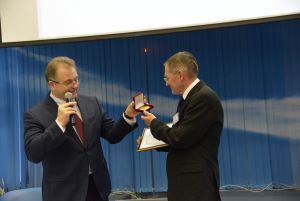
Traditional scientific-practical seminar "Media linguistics: problems and perspectives" took place on April 23-24 in St. Petersburg as a part of the International Scientific Forum "Mass Media in The Modern World. 54th St. Petersburg Readings". The seminar was held under the auspices of Media linguistic Commission of the International Committee of Slavists. This year the name of the seminar is "Professional speech communication and mass media". Before the seminar the collection which cover the articles almost 90 participants from more than 20 cities of Russia (from St. Petersburg to Krasnoyarsk), from different cities of Ukraine, Belarus, Bulgaria, Poland, China, Czech Republic, Moldova, USA was published (
http://medialing.spbu.ru/upload/files/file...343475_2861.pdf). The participants discussed the current state and perspectives of linguistic studies of professional communication in the media and using the media.
The forum opened with a presentation of the international scientific journal "Media linguistics", conducted by executive editor of the journal Natalia Kornilova (St. Petersburg State University).
At the opening of the Forum the ceremony of the Neva prize in the field of studying journalism and mass communications took place. In the nomination "Recognition" Stanislaw Gaida, Professor of the University of Opole (Poland), special guest of the seminar "Professional speech communication and mass media" became a laureate for contribution to the development of linguistic studies of the language of media. At the plenary session of the Forum, he made a report "(Media)linguistic dilemmas", where he presented the reflections associated with the problems of formation of media linguistics as an integrated scientific discipline. According to the scientist, media linguistics stands in the way of integration of methodological pluralism, in which the subject of cognition must consider four mutually irreducible perspectives associated with the forms of existence of language: the practice of linguistic communication, system, and individual and collective linguistic consciousness.
The seminar consists of two plenary sessions and four discussions.
The first plenary session
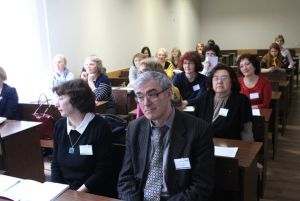 The first plenary session was moderated by professor T. Dobrosklonskaya (Lomonosov Moscow State University) and professor L. Duskaeva (Saint-Petersburg State University).
The first plenary session was moderated by professor T. Dobrosklonskaya (Lomonosov Moscow State University) and professor L. Duskaeva (Saint-Petersburg State University).
The meeting was opened by the speech of professor O. Goichman (Russian New University), which was devoted to the peculiarities of professional speech communication in the media. Clarifying the concept of professional speech, the speaker drew attention to the fact that the determining factor of interaction in the professional field are the professional qualities of the author/character of media texts.
Applied aspects of the media linguistic studies were presented by professor T. Dobrosklonskaya (Lomonosov Moscow State University). According to the author, the potential of application of media-linguistics is largely due to the discovery of the mechanism of formation of the information picture of the world and the impact on individual and mass consciousness. T. Dobrosklonskaya presented her information deployment model, which allows to identify the mechanism of turning real life events into a media event that includes five cyclically connected components (selection of facts, event coverage, image creation, stereotyping, cultural and ideological context). Special attention was paid to the issues of interpretation and its role in the construction of news events (it is proposed to use the term "range of interpretation").
A report of professor V. Ivchenkov (Belarusian State University, Belarus) was devoted to the question of the status of media-linguistics as an integrated scientific line of investigation in an era when the role and nature of the media texts are changing rapidly (media turn into a catalyst for political decision-making, social projects implementation and large-scale integrations, actively penetrate into the sphere of virtual communication, integrate into social networks). V. Ivchenkov drew attention to the changing professional role of the journalist, the digitalization of journalism, developing of the journalism of opinion and a number of other trends, the distribution of which means the necessity to develop new techniques of exploring the media speech potential, including studies of particular communicative practices.
In the message of professor K. Rogova (Saint-Petersburg State University) grammatical role of pragmatics in forming of the media texts meaning has been disclosed. Considerable attention was paid to the development of syntactic studies in the context of speech studies, the relationship between syntax and speech/text as well as the question of the types of syntactic structures as part of the main genres of media texts — informational and analytical. Professor K. A. Rogova emphasized that speech products can be treated as dynamic and pretty chaotic couplings of formal and semantic features.
Address of professor L. Tsoneva (St. Cyril and St. Methodius University of Veliko Turnovo, Bulgaria) was dedicated to the word "Crimea" and peculiarities of its use in Russian media discourse. According to the speaker, word-formation activity is one of the most important characteristics of the word "Crimea". The emergence and active use of derivative units reflects the desire to express the attitude to socio-political events. Besides enhanced derivational potential, popular keywords are charachterized by frequent usage in language-games.
In the report of T. Shmeleva (Yaroslav-the-Wise Novgorod State University) cases of professional journalistic reflection were considered on the material of three media texts. Main attention was paid to journalistic reflection of such media-linguistics issues as: the nature of media and its relationship to the literature, the author and his manifestation in the text, the addressee and the speaker’s relationship to him, the technology of media text creation, attitude to the language resources and the canons of the genre, the difference between journalism and PR and advertising. Professor T. Shmeleva mentioned the positive impact that such “reflectional” texts have on the professional sphere. Finally, professor T. Shmeleva encouraged researchers to create a body of reflective media texts and stressed the importance of their use in the practice of teaching students in the "Journalism" specialty.
Outcomes of the plenary meeting were summed by professor L. Duskaeva (Saint-Petersburg State University), who highlighted the extreme diversity of media texts. According to her, the perception of media as an integral part of professional speech activity allows to raise media speech studies to new heights.
The discussion “Concepts, categories and methods of analysis in medialinguistic”
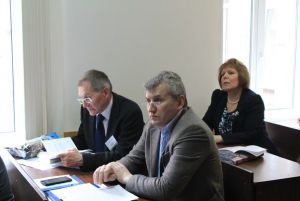 The discussion which included 7 presentations was moderated by professors E. Remchukova (RUDN, Moscow) and T.Chernyshova (Altay University, Barnaul). During the discussion the focus of attention was on the stylistic aspects of the oral television speech, textual and genre salience of media communication products.
The discussion which included 7 presentations was moderated by professors E. Remchukova (RUDN, Moscow) and T.Chernyshova (Altay University, Barnaul). During the discussion the focus of attention was on the stylistic aspects of the oral television speech, textual and genre salience of media communication products.
The discussion “Typology of speech”
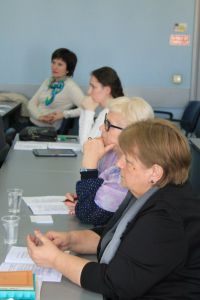 The discussion in which more than 20 people took part was moderated by professor I. Annenkova (Moscow state Lomonosov university) and professor E. Malysheva (Omsk state Dostoevskiy university). The speakers analysed dynamic processes in different types of discourses, systematized and described diverse language facts and phenomena, representing linguocognitive, linguocultural an communicative specificity of contemporary discourse practices. All talks demonstrated high level of theoretical awareness of the problems discussed, and were characterized by clear practical applicability of the conducted research especially from the point of view of their usage in education and training of media specialists.
The discussion in which more than 20 people took part was moderated by professor I. Annenkova (Moscow state Lomonosov university) and professor E. Malysheva (Omsk state Dostoevskiy university). The speakers analysed dynamic processes in different types of discourses, systematized and described diverse language facts and phenomena, representing linguocognitive, linguocultural an communicative specificity of contemporary discourse practices. All talks demonstrated high level of theoretical awareness of the problems discussed, and were characterized by clear practical applicability of the conducted research especially from the point of view of their usage in education and training of media specialists.
The discussion «Mediatext: structure, composition, vectors of innovation”
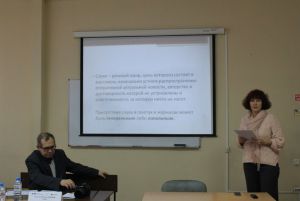 The discussion moderated by professor E. Osetrova (Krasnoyarsk) and professor V. Konkov (Saint-Petersburg) united more than 25 participants. During the discussion the attention was focused on different aspects of studying meditexts: 1) their typology, 2) compositional structure, 3) means of enhancing their potential effect on the audience.
The discussion moderated by professor E. Osetrova (Krasnoyarsk) and professor V. Konkov (Saint-Petersburg) united more than 25 participants. During the discussion the attention was focused on different aspects of studying meditexts: 1) their typology, 2) compositional structure, 3) means of enhancing their potential effect on the audience.
The discussion “The functioning of language means in mass media”
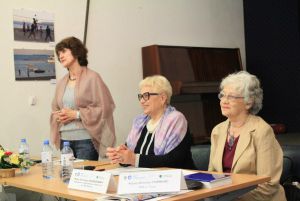 The discussion conducted by professor M. Konyushkevich (Grodno, Belorussia) and professor N. Sulimenko (Saint-Petersburg) included 8 talks. The problems analysed were structured around the following topics: 1) the use and the expressive impact of language means in mass media; 2) the impact of speech production in the media on changes in the language system; 3) media speech pragmatics; 4) issues related to linguistic expertise of speech in mass media.
The discussion conducted by professor M. Konyushkevich (Grodno, Belorussia) and professor N. Sulimenko (Saint-Petersburg) included 8 talks. The problems analysed were structured around the following topics: 1) the use and the expressive impact of language means in mass media; 2) the impact of speech production in the media on changes in the language system; 3) media speech pragmatics; 4) issues related to linguistic expertise of speech in mass media.
The last plenary session
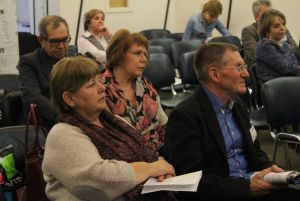 Professors M. Kormilitsyna and O. Sirotinina (Saratov, Russia) in their joint presentation "The importance of communication risks awareness for journalist successful professional activity" have defined the notion of a communicative risk treated as a factor leading to misunderstanding of communication partners. Such factors include journalist specific job conditions - time deficit when working in a live program, consideration of various implications of possible violation of law (especially dealing with invectives or extremist propaganda) and jornalist dependance on editors or sponsors policy. However the main hasard in this field of activity is a lack of journalist (and editor) communicative competence. Professor O. Issers (Omsk, Russia) in her presentation titled "Fakes go flying: false information in adverizing and new media practices" spoke about ludic questionable information spread in public communication with various objectives, mainly to attract the audience attention, to entertain them and to tumble their stereotypes in a playful way. Such texts became frequent in our internet era. They may be defined as quasi-facts which emphasize the problem, are easily memorized and thus can be effectively used to influence the public. Professor V. Karasik (Volgograd, Russia) in his presentation "Banalization as a manipulative action in media discourse" has described well known assertions usage cases in communication. Banal implications usually turn off a critical rational mode of information perception and thus make public an easy capture for manipulators. Professor L. Duskaeva (Saint-Petersburg) in her presentation "Professional communication in mass media” has demonstrated heuristic advantages of praxeological approach in media linguistics. This approach is aimed at the determination of various activity types organization. There exist at least three spheres of professional communication in media environment – journalist, advertizing and image making activity, and they differ in their conditions of realization, content and the corresponding requirements. Each of them is presented in their specific text groups. A praxeological approach enables us to trace the pragmatic message and meaning structure of the texts specified and to explain their linguistic essence in various professional spheres with the emphasis on the language means used in those spheres, e.g. imperative meanings are mostly expressed in indirect communication means which is determined by journalist social status. On the other hand, media nature of mass communication gives a rise to proliferation of nonverbal presentation means such as graphs and diagrams.
Professors M. Kormilitsyna and O. Sirotinina (Saratov, Russia) in their joint presentation "The importance of communication risks awareness for journalist successful professional activity" have defined the notion of a communicative risk treated as a factor leading to misunderstanding of communication partners. Such factors include journalist specific job conditions - time deficit when working in a live program, consideration of various implications of possible violation of law (especially dealing with invectives or extremist propaganda) and jornalist dependance on editors or sponsors policy. However the main hasard in this field of activity is a lack of journalist (and editor) communicative competence. Professor O. Issers (Omsk, Russia) in her presentation titled "Fakes go flying: false information in adverizing and new media practices" spoke about ludic questionable information spread in public communication with various objectives, mainly to attract the audience attention, to entertain them and to tumble their stereotypes in a playful way. Such texts became frequent in our internet era. They may be defined as quasi-facts which emphasize the problem, are easily memorized and thus can be effectively used to influence the public. Professor V. Karasik (Volgograd, Russia) in his presentation "Banalization as a manipulative action in media discourse" has described well known assertions usage cases in communication. Banal implications usually turn off a critical rational mode of information perception and thus make public an easy capture for manipulators. Professor L. Duskaeva (Saint-Petersburg) in her presentation "Professional communication in mass media” has demonstrated heuristic advantages of praxeological approach in media linguistics. This approach is aimed at the determination of various activity types organization. There exist at least three spheres of professional communication in media environment – journalist, advertizing and image making activity, and they differ in their conditions of realization, content and the corresponding requirements. Each of them is presented in their specific text groups. A praxeological approach enables us to trace the pragmatic message and meaning structure of the texts specified and to explain their linguistic essence in various professional spheres with the emphasis on the language means used in those spheres, e.g. imperative meanings are mostly expressed in indirect communication means which is determined by journalist social status. On the other hand, media nature of mass communication gives a rise to proliferation of nonverbal presentation means such as graphs and diagrams.
Professor N. Tsvetova (Saint-Petersburg) in her presentation "An exterior Russian language jornalist art text in linguistic praxeological perspective" has analyzed media text as the central category of linguistic praxeology. This category is treated as realization of professional communication of journalists, copywriters and PR specialists. It is important that a media text reflects not only the result, but also the process of cognitive and influencing activity aimed at professional objectives achievement. Exterior Russian newspaper texts correspond to the same speech activity algorithms as those established in the journalist community. Such approach makes it possible to see both effective and not effective rules of professional journalist behavior and to work out the discordance criteria and correction recommendations.
The report is prepared by Tatyana Dobrosklonskaya (Lomonosov Moscow state university),
Vladimir Karasik (Volgograd social-pedagogical university),
Yulia Konyaeva and
Alexey Goryachev (both - St. Petersburg state university).


 Traditional scientific-practical seminar "Media linguistics: problems and perspectives" took place on April 23-24 in St. Petersburg as a part of the International Scientific Forum "Mass Media in The Modern World. 54th St. Petersburg Readings". The seminar was held under the auspices of Media linguistic Commission of the International Committee of Slavists. This year the name of the seminar is "Professional speech communication and mass media". Before the seminar the collection which cover the articles almost 90 participants from more than 20 cities of Russia (from St. Petersburg to Krasnoyarsk), from different cities of Ukraine, Belarus, Bulgaria, Poland, China, Czech Republic, Moldova, USA was published (
Traditional scientific-practical seminar "Media linguistics: problems and perspectives" took place on April 23-24 in St. Petersburg as a part of the International Scientific Forum "Mass Media in The Modern World. 54th St. Petersburg Readings". The seminar was held under the auspices of Media linguistic Commission of the International Committee of Slavists. This year the name of the seminar is "Professional speech communication and mass media". Before the seminar the collection which cover the articles almost 90 participants from more than 20 cities of Russia (from St. Petersburg to Krasnoyarsk), from different cities of Ukraine, Belarus, Bulgaria, Poland, China, Czech Republic, Moldova, USA was published ( The first plenary session was moderated by professor T. Dobrosklonskaya (Lomonosov Moscow State University) and professor L. Duskaeva (Saint-Petersburg State University).
The first plenary session was moderated by professor T. Dobrosklonskaya (Lomonosov Moscow State University) and professor L. Duskaeva (Saint-Petersburg State University).
 The discussion which included 7 presentations was moderated by professors E. Remchukova (RUDN, Moscow) and T.Chernyshova (Altay University, Barnaul). During the discussion the focus of attention was on the stylistic aspects of the oral television speech, textual and genre salience of media communication products.
The discussion which included 7 presentations was moderated by professors E. Remchukova (RUDN, Moscow) and T.Chernyshova (Altay University, Barnaul). During the discussion the focus of attention was on the stylistic aspects of the oral television speech, textual and genre salience of media communication products.
 The discussion in which more than 20 people took part was moderated by professor I. Annenkova (Moscow state Lomonosov university) and professor E. Malysheva (Omsk state Dostoevskiy university). The speakers analysed dynamic processes in different types of discourses, systematized and described diverse language facts and phenomena, representing linguocognitive, linguocultural an communicative specificity of contemporary discourse practices. All talks demonstrated high level of theoretical awareness of the problems discussed, and were characterized by clear practical applicability of the conducted research especially from the point of view of their usage in education and training of media specialists.
The discussion in which more than 20 people took part was moderated by professor I. Annenkova (Moscow state Lomonosov university) and professor E. Malysheva (Omsk state Dostoevskiy university). The speakers analysed dynamic processes in different types of discourses, systematized and described diverse language facts and phenomena, representing linguocognitive, linguocultural an communicative specificity of contemporary discourse practices. All talks demonstrated high level of theoretical awareness of the problems discussed, and were characterized by clear practical applicability of the conducted research especially from the point of view of their usage in education and training of media specialists.
 The discussion moderated by professor E. Osetrova (Krasnoyarsk) and professor V. Konkov (Saint-Petersburg) united more than 25 participants. During the discussion the attention was focused on different aspects of studying meditexts: 1) their typology, 2) compositional structure, 3) means of enhancing their potential effect on the audience.
The discussion moderated by professor E. Osetrova (Krasnoyarsk) and professor V. Konkov (Saint-Petersburg) united more than 25 participants. During the discussion the attention was focused on different aspects of studying meditexts: 1) their typology, 2) compositional structure, 3) means of enhancing their potential effect on the audience.
 The discussion conducted by professor M. Konyushkevich (Grodno, Belorussia) and professor N. Sulimenko (Saint-Petersburg) included 8 talks. The problems analysed were structured around the following topics: 1) the use and the expressive impact of language means in mass media; 2) the impact of speech production in the media on changes in the language system; 3) media speech pragmatics; 4) issues related to linguistic expertise of speech in mass media.
The discussion conducted by professor M. Konyushkevich (Grodno, Belorussia) and professor N. Sulimenko (Saint-Petersburg) included 8 talks. The problems analysed were structured around the following topics: 1) the use and the expressive impact of language means in mass media; 2) the impact of speech production in the media on changes in the language system; 3) media speech pragmatics; 4) issues related to linguistic expertise of speech in mass media.
 Professors M. Kormilitsyna and O. Sirotinina (Saratov, Russia) in their joint presentation "The importance of communication risks awareness for journalist successful professional activity" have defined the notion of a communicative risk treated as a factor leading to misunderstanding of communication partners. Such factors include journalist specific job conditions - time deficit when working in a live program, consideration of various implications of possible violation of law (especially dealing with invectives or extremist propaganda) and jornalist dependance on editors or sponsors policy. However the main hasard in this field of activity is a lack of journalist (and editor) communicative competence. Professor O. Issers (Omsk, Russia) in her presentation titled "Fakes go flying: false information in adverizing and new media practices" spoke about ludic questionable information spread in public communication with various objectives, mainly to attract the audience attention, to entertain them and to tumble their stereotypes in a playful way. Such texts became frequent in our internet era. They may be defined as quasi-facts which emphasize the problem, are easily memorized and thus can be effectively used to influence the public. Professor V. Karasik (Volgograd, Russia) in his presentation "Banalization as a manipulative action in media discourse" has described well known assertions usage cases in communication. Banal implications usually turn off a critical rational mode of information perception and thus make public an easy capture for manipulators. Professor L. Duskaeva (Saint-Petersburg) in her presentation "Professional communication in mass media” has demonstrated heuristic advantages of praxeological approach in media linguistics. This approach is aimed at the determination of various activity types organization. There exist at least three spheres of professional communication in media environment – journalist, advertizing and image making activity, and they differ in their conditions of realization, content and the corresponding requirements. Each of them is presented in their specific text groups. A praxeological approach enables us to trace the pragmatic message and meaning structure of the texts specified and to explain their linguistic essence in various professional spheres with the emphasis on the language means used in those spheres, e.g. imperative meanings are mostly expressed in indirect communication means which is determined by journalist social status. On the other hand, media nature of mass communication gives a rise to proliferation of nonverbal presentation means such as graphs and diagrams.
Professors M. Kormilitsyna and O. Sirotinina (Saratov, Russia) in their joint presentation "The importance of communication risks awareness for journalist successful professional activity" have defined the notion of a communicative risk treated as a factor leading to misunderstanding of communication partners. Such factors include journalist specific job conditions - time deficit when working in a live program, consideration of various implications of possible violation of law (especially dealing with invectives or extremist propaganda) and jornalist dependance on editors or sponsors policy. However the main hasard in this field of activity is a lack of journalist (and editor) communicative competence. Professor O. Issers (Omsk, Russia) in her presentation titled "Fakes go flying: false information in adverizing and new media practices" spoke about ludic questionable information spread in public communication with various objectives, mainly to attract the audience attention, to entertain them and to tumble their stereotypes in a playful way. Such texts became frequent in our internet era. They may be defined as quasi-facts which emphasize the problem, are easily memorized and thus can be effectively used to influence the public. Professor V. Karasik (Volgograd, Russia) in his presentation "Banalization as a manipulative action in media discourse" has described well known assertions usage cases in communication. Banal implications usually turn off a critical rational mode of information perception and thus make public an easy capture for manipulators. Professor L. Duskaeva (Saint-Petersburg) in her presentation "Professional communication in mass media” has demonstrated heuristic advantages of praxeological approach in media linguistics. This approach is aimed at the determination of various activity types organization. There exist at least three spheres of professional communication in media environment – journalist, advertizing and image making activity, and they differ in their conditions of realization, content and the corresponding requirements. Each of them is presented in their specific text groups. A praxeological approach enables us to trace the pragmatic message and meaning structure of the texts specified and to explain their linguistic essence in various professional spheres with the emphasis on the language means used in those spheres, e.g. imperative meanings are mostly expressed in indirect communication means which is determined by journalist social status. On the other hand, media nature of mass communication gives a rise to proliferation of nonverbal presentation means such as graphs and diagrams.